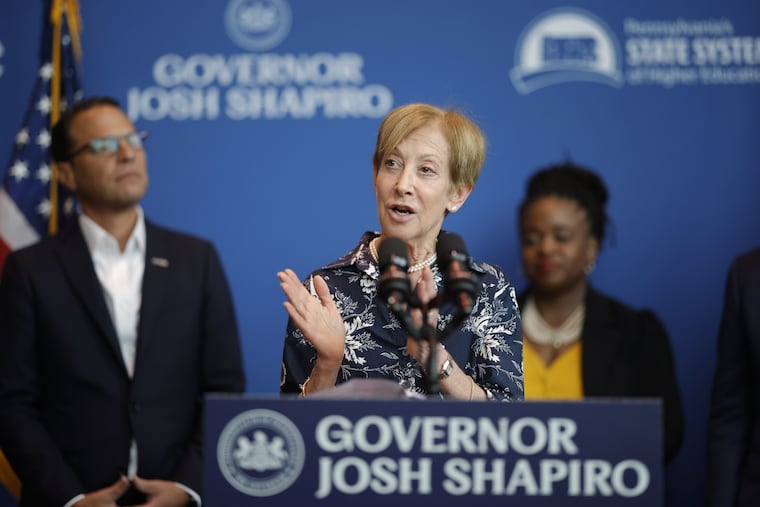Temple, Lincoln, and St. Joe’s presidents will serve on the new Pennsylvania higher education board
Cynthia Shapira, who leads the governing board overseeing Pennsylvania’s state university system, will chair the new body.

Members of a new higher education board charged with creating a strategic plan and improving coordination among Pennsylvania’s many public and private colleges were appointed this month and will begin their work soon.
The 21-member board that includes college presidents, representatives from business and labor, legislators, students, and faculty will be led by Cynthia Shapira, a higher education and nonprofit consultant who has chaired the board of governors for the Pennsylvania State System of Higher Education since July 2016. Brenda Allen, president of Lincoln University, a state-related historically Black college in Chester County, will serve as vice chair.
Other local leaders named to the board by Gov. Josh Shapiro include Temple University president Richard M. Englert — who will be replaced by John A. Fry when he becomes Temple’s president Nov. 1 — and St. Joseph’s University president Cheryl McConnell.
» READ MORE: Scholarships, funding, and oversight boards: Higher education takeaways from the Pa. state budget
Kate Shaw, deputy secretary and commissioner for Postsecondary and Higher Education, called the new board “an exciting new chapter” for the state’s colleges and universities that “will, for the first time in Pennsylvania’s history, bring all sectors of higher education together to chart a bold new vision for higher education and provide the capacity and support needed to make this vision a reality.”
“Pennsylvania,” she said, “faces a large and growing workforce credential crisis, and too many communities lack access to affordable postsecondary credentials that will lead to good-paying jobs. A bright economic future for the Commonwealth requires colleges and universities to collaborate with each other and work with employers, labor leaders, students, legislators, and members of the administration to solve these problems together.”
She said the board likely would be holding its first meeting later this month.
The General Assembly also made four appointments to the board: Sen. Jay Costa (D., Allegheny); Sen. Wayne Langerholc (R., Cambria); Rep. Peter Schweyer (D., Lehigh); and Rep. Jesse Topper (R., Bedford).
The board, which came out of budget negotiations earlier this year, also will be charged with improving access and affordability and making sure colleges are providing the proper training to meet workforce needs, especially in shortage areas.
And it will create a council that will develop recommendations for performance-based funding for state-related universities, including Temple, Pennsylvania State University, and the University of Pittsburgh. Graduation and retention rates and job outcomes are among the criteria likely to be included. The establishment of the council likely will be one of the board’s first actions, given that it is expected to develop recommendations by the end of April, Shaw said.
» READ MORE: A plan to overhaul Pa.’s higher education landscape is a long time coming, but questions remain.
The board also has been tasked with developing procedures by July 1, 2026, to ensure orderly closures of colleges, proper teach-out plans, and the proper preservation of an institution’s records. Legislators sought greater oversight after the University of the Arts abruptly closed in June with one week’s notice to students and faculty.
For years, some have cited the need for an overarching board that could better plan how Pennsylvania’s plethora of private colleges, state and state-related universities, and community colleges can work together to meet the needs of students and the state’s workforce. Its only regulatory authority will be over community colleges, a role that until now had been served by the Board of Education, and cover the establishment or closure of a school, the addition of branch campuses, a change in a school’s sponsorship, or the addition of degrees above an associate’s. Community colleges otherwise will maintain their autonomy over their local operations.
Shapira said in a statement that she was honored to be named inaugural chair.
“Our colleges and universities have all achieved so much as institutions, and we now have the opportunity to achieve even more — together — through greater coordination and strategic action,” said Shapira, who also will remain chair of the PASSHE board.
Penn student Sean Eden also was appointed to the board.
“I am excited to serve in office with my fellow board members,” he wrote on LinkedIn. “The end of my term will be marked by my graduation … and I am thoroughly looking forward to serving the Pennsylvania Commonwealth and representing all students.”
Other members of the board include:
Ann Bieber, president of Lehigh Carbon Community College
Kara Laskowski, communication studies professor at Shippensburg University and a member of the faculty union
Kenneth Long, president of East Stroudsburg University
Pedro Rivera, president of Thaddeus Stevens College of Technology
Andrea Shirk, president and CEO of Rock Lititz
Michael Wade Smith, senior vice president and chief of staff at Penn State
Michael Warfel, vice president of governmental affairs at Highmark Inc.
Kevin Washo, chief of staff to the chancellor at the University of Pittsburgh
Bobbie Jo Zapor, library assistant at Indiana University of Pennsylvania and president of the American Federation of State, County, and Municipal Employees (AFSCME) Local 763
Khalid Mumin, Secretary of the Department of Education
Nancy Walker, Secretary of Labor & Industry
Another student has yet to be confirmed.